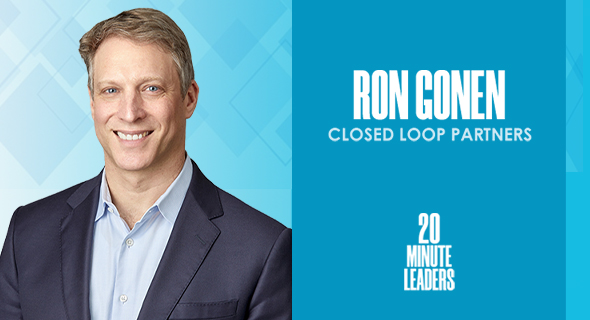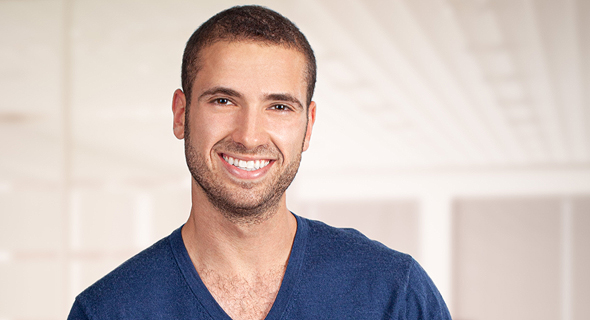20-Minute Leaders
“The most efficient economy is a circular one where you're continually reusing materials.”
Sustainability and impact were not hot topics when Ron Gonen, founder and CEO of Closed Loop Partners, was in high school, but he knew that was the field he wanted to be in.
Click Here For More 20MinuteLeaders
You were a consultant with Deloitte, then an entrepreneur running a company, and then worked for the Bloomberg administration in sanitation, recycling, and sustainability. Now you’re the founder and CEO of Closed Loop Partners. Did you know you were going to be dealing with the circular economy and sustainability from a young age?
The inspiration was always to be doing this. In high school, I would talk about my interest in sustainability and impact. I feel very fortunate to be somebody that has really been able to fulfill their aspiration. There's been a number of ups and downs, but the trajectory has always been something that I've hoped for.
Today, if you're running a sustainability company, everybody claps for you and there’s different funds for you. I don't think that was the case in 2004 when you ran RecycleBank. What was that experience like?
I went back to business school at Columbia Business School in 2002. Previous to that, I'd been in management consulting at Deloitte. It gave me a really important foundation. But my real passion was in sustainability and the intersection between social impact and targeting great financial returns.
My first day at Columbia Business School, everyone was asked, "What do you want to do when you graduate?" There were a bunch of responses regarding investment banks, strategy consulting, and hedge funds. Then I communicated my interest around building a company at this intersection between sustainable business practices and maximizing returns. People literally thought that I had come to the wrong meeting.
While I was at business school, I co-founded my first company, RecycleBank. Columbia Business School actually became the seed investor in the company.
 Ron Gonen, founder and CEO of Closed Loop Partners. Photo: Ron Gonen
Ron Gonen, founder and CEO of Closed Loop Partners. Photo: Ron Gonen
You moved then from business school, the entrepreneurship scene, to public policy with Michael Bloomberg's administration from 2012 to 2014. What was that like?
The deputy mayor recognized that the sanitation could be managed in New York City in a more advanced and financially efficient way and created this new position called Deputy Commissioner for Sanitation, Recycling and Sustainability. I was recruited to build out the next iteration of what the sanitation department should look like, the next generation way to manage resources in the city.
Was that an easy transition for you? How did that personally feel?
I think joining the Bloomberg administration was a once in a lifetime experience. I encourage everybody to pursue a public office in some capacity sometime in their life. It's very rewarding to be able to serve your community.
I was able to supplement my business skills with things that you have to learn in government, like how to build consensus. Developing that skillset and then bringing it back to business, I found to be very rewarding.
You've been working on Closed Loop Partners and the circular economy over the last several years. What's happening to our world today in your perspective? Where are you personally pushing us to move forward in this circular economy type of world?
What we've been presented with in the Western world is that we live in a capitalist system that promotes a meritocracy. But the way our economy has actually been structured over the past 75 years is not a meritocracy. It's not a system where the person that works the hardest or has the best product ends up winning.
We've actually created a system that is designed for the financial benefit of certain industries. The result is that we have a manufacturing system that's based on a linear economy. You extract the natural resource. You use it for a product designed to be used essentially once and then disposed of in a landfill.
A true capitalist would build a system in which you optimize for efficiency, where you develop advanced products where you don't have to extract natural resources. You would design systems where you can continually recycle and continually reuse materials so you don't have to pay for landfills.
That was a recognition that I and a number of other people had: the most effective and efficient economy that we should be operating under is one that is circular. That was really the genesis behind launching Closed Loop Partners.
What was the rationale behind performing that out of multiple investment arms that have unique expertise in their own domains?
I was interested in designing a firm that would be able to invest anywhere along the growth trajectory of a solution. We look at the supply chains from A to Z in several industries, identify where the bottlenecks are, identify where there are solutions.
If it's an early-stage solution, we have a venture fund that can apply capital. If it's an infrastructure solution that requires project financing or debt, we have our infrastructure fund. If it's an opportunity to acquire a company and scale it, we have our private equity fund. If there isn’t a solution in the market, we have an innovation center that will help develop a solution and commercialize it.
What was that like building it from the ground up?
After I exited my first company, I started teaching a course on entrepreneurship and social impact. One of the key lessons I tried to communicate to the students was that the three most important things I've learned in business are: people, people, people.
The development of Closed Loop Partners was a combination of this group of people that really have been with me for most of my career and then others that have either approached me or I've recruited. But the most important piece of this is I've learned to invest an enormous amount of my time in recruiting people and developing culture.
I want to have a positive impact on the world and participate in the circular economy when I start my own company. What are some things that I should be keeping in mind to build the right vision?
The best impact you could have, I believe, is providing somebody with a good job. We shouldn't get too flowery about sustainability and that impact is starting a company that's going to change the world. It's actually much more basic and achievable.
The best impact you can have is by providing somebody a good job in which they feel challenged intellectually and they're respected for whatever they're doing. And there's transparency in how decisions are made. If you're just doing that, you're actually having a really important impact on the world.
Beyond that, I would look at what my company is doing that's making some person's life, a community, or part of our environment better.
How early did you know this was your calling?
Very early. I grew up with a single mom in Philadelphia in the 1980s. For fourth grade, I had to go to one of the worst public schools in Philadelphia.
I recognized that this message that “in America, it's all about pulling yourself up by the bootstraps” was a complete fallacy. I looked around at that school and thought, "There's no way anyone's making it out of here and becoming some type of great success."
From there, I got to move to a good public school and one of the best private schools in the US. It further emphasized for me what actually was going on in America. It was not capitalism. That's not optimizing for economics or for your economy. You can agree with it socially or not. It's just not capitalism. That's probably the first instance in my life of recognizing that the system can be further optimized and the world can be a better place.
 Michael Matias. Photo: Courtesy
Michael Matias. Photo: Courtesy
Michael Matias, Forbes 30 Under 30, is the author of Age is Only an Int: Lessons I Learned as a Young Entrepreneur. He studies Artificial Intelligence at Stanford University, is a Venture Partner at J-Ventures and was an engineer at Hippo Insurance. Matias previously served as an officer in the 8200 unit. 20MinuteLeaders is a tech entrepreneurship interview series featuring one-on-one interviews with fascinating founders, innovators and thought leaders sharing their journeys and experiences.
Contributing editors: Michael Matias, Megan Ryan



